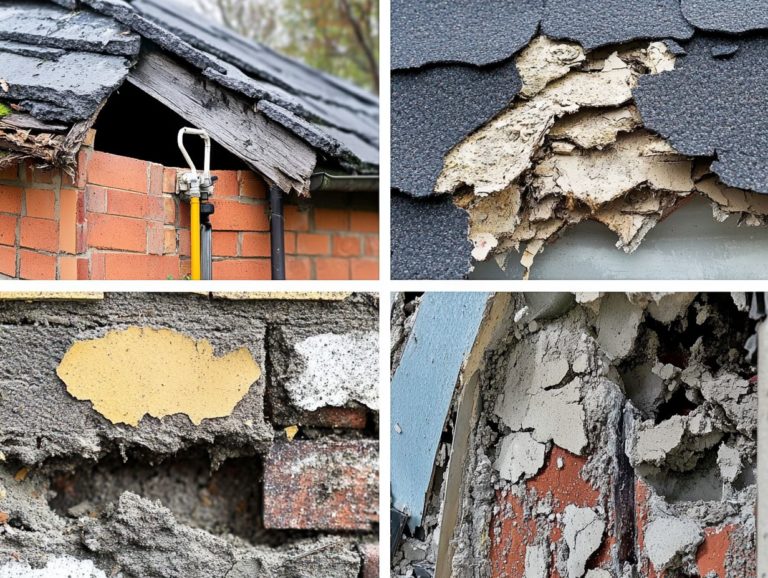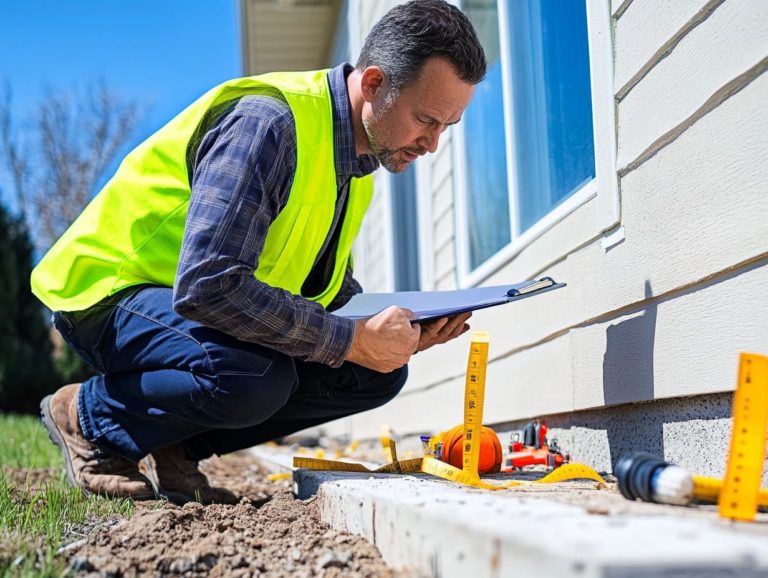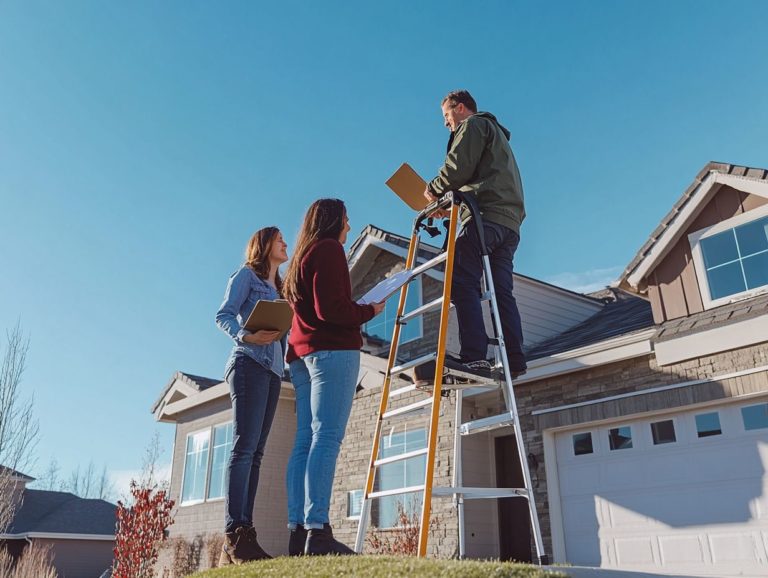How to Interpret Home Inspection Findings
When you re in the market for a home, investing in a thorough inspection can spare you from expensive surprises later on.
Home inspections are a game-changer for your investment! They uncover potential structural and mechanical issues and empower you during negotiations with sellers.
This article highlights the significance of home inspections, common findings, and how to interpret those findings effectively.
It explains how to handle issues that arise, from negotiating repairs to knowing when to request a re-inspection. Whether you re a first-time buyer or a seasoned homeowner, understanding these aspects is crucial to protecting your investment!
Contents
Key Takeaways:

Home inspections are essential in identifying potential issues in a property before purchasing.
Common findings include structural, mechanical, electrical, and plumbing problems. Understanding home inspection terminology and reports is vital for negotiating repairs with sellers.
The Importance of Home Inspections
Home inspections play a vital role in real estate transactions. They serve as an essential resource for both buyers and sellers.
Engaging a certified inspector provides insights into safety concerns and defects. This knowledge helps you make informed decisions about the property.
The inspection report details the state of major systems and structural elements. It also serves as a powerful negotiation tool, influencing the home’s value in the competitive real estate market.
Why Home Inspections are Necessary
Home inspections are crucial whether you’re buying or selling, helping you navigate real estate transactions with confidence.
These evaluations identify safety risks, such as structural issues or outdated electrical systems. They outline necessary repairs, giving buyers a clear picture of potential renovations.
Both buyers and sellers gain from this process. Buyers can negotiate repairs or price adjustments, while sellers can justify their asking price based on inspection results.
Common Findings in Home Inspections
During a home inspection, you may encounter various findings, including structural elements and essential repairs. It’s crucial to grasp understanding the home inspection report to make informed decisions.
These issues can significantly impact the safety and functionality of the property, emphasizing the need for thorough evaluations.
Structural Issues
Structural problems can include foundation issues and roof concerns that affect the property’s integrity.
Ignoring these issues jeopardizes safety and market value. For instance, a cracked foundation might indicate deeper deficiencies, leading to costly repairs.
A deteriorating roof can also lead to water damage and mold growth, threatening your home’s safety.
Home inspectors are trained to spot these critical concerns. Understanding these details allows you to make informed decisions about your investment.
Mechanical and Electrical Problems

Mechanical and electrical problems uncovered during home inspections can lead to significant safety concerns. Issues with electrical systems or faulty mechanisms can arise. These problems can range from outdated wiring that poses serious fire hazards to malfunctioning HVAC systems that jeopardize your heating and cooling efficiency.
For example, you might notice flickering lights or frequent breaker trips. These could signal potential electrical overloads or poor connections. Don t wait to fix these issues! Act now to protect your home.
Recommended repairs typically include:
- Upgrading old fuse boxes
- Installing protective circuit breakers
- Ensuring proper grounding of electrical systems
Routine servicing of HVAC systems helps you avoid costly breakdowns and improves indoor air quality. Taking these steps not only safeguards your home but also enhances your overall comfort and peace of mind.
Plumbing and Water Damage
Plumbing issues and signs of water damage often take center stage during home inspections. They demand your immediate attention to prevent further deterioration.
You might uncover hidden leaks that can quietly undermine the integrity of your walls and ceilings over time. Those seemingly minor drips can escalate into significant mold growth, posing serious health risks for everyone in the home.
Signs of rust or corrosion may signal impending pipe failure. Swift action is necessary. Regular plumbing inspections and ongoing maintenance are essential; they not only help you identify potential problems early but also extend the lifespan of your plumbing systems.
Skipping these inspections could lead to costly repairs and unwelcome surprises that disrupt your daily life.
Interpreting Inspection Reports
Interpreting home inspection reports is crucial for you as a home buyer or seller. Understanding the findings and recommendations provided by the certified inspector gives you the power to make informed decisions. For guidance, check out this resource on how to read a home inspection report, which can help with potential repairs and negotiations.
Knowing this information will help you plan your next steps. It ensures you navigate the process with confidence and clarity.
Understanding Terminology and Severity
Understanding the terminology used in inspection reports is essential for you to accurately interpret the severity of safety issues and necessary repairs identified during the home inspection. To help with this, here’s a guide on how to make sense of home inspection terms.
By familiarizing yourself with common inspection terms, you can make more informed decisions about the necessary actions. Knowing what to do after a home inspection empowers you to prioritize your repairs.
Terms like “big problem,” which points to a significant issue demanding immediate attention, or “needs improvement,” indicating something that requires improvement, are crucial for determining the urgency of repairs.
Grasping how to assess these issues enables you to identify which aspects pose the greatest risk. It s not just about noting problems; it s about recognizing the implications of each issue.
Addressing Issues Found in the Inspection
Addressing issues uncovered during a home inspection requires careful negotiation between you, the home buyer, and the seller.
It s all about navigating repair responsibilities and exploring financial adjustments through an escrow account. This ensures that both parties feel satisfied with the outcome.
Negotiating Repairs with Sellers

Negotiating repairs with sellers can grant you invaluable leverage as a home buyer. It gives you the power to request repair credits or direct fixes based on the insights gathered from the inspection findings.
By meticulously evaluating the inspection report, you can pinpoint critical issues that may impact both the property’s value and your long-term satisfaction. Knowing what to look for in a home inspection report is essential in this process.
Presenting this information in a clear and organized manner highlights the seriousness of your concerns and bolsters your position during discussions.
Employing strategies such as showcasing comparable properties that lack similar defects can further reinforce your requests. Maintaining open communication with the seller throughout the process cultivates a collaborative atmosphere, significantly increasing the chances of arriving at a mutually beneficial agreement.
DIY vs Professional Repairs
When faced with home defects, you might find yourself caught in the classic dilemma of choosing between DIY repairs and hiring professionals. This decision involves weighing numerous factors, such as the risks of injury, costs tied to materials and tools, and the long-term sustainability of your repair efforts.
Taking on a project yourself can save money and help you learn new skills. However, it s essential to consider the expertise and warranty protections that professionals provide.
For intricate issues like electrical or plumbing work, the safety risks can easily overshadow the advantages of a DIY approach. Therefore, evaluate your skill set alongside the complexity of the task before making a decision.
Re-inspections and Follow-up
Re-inspections and follow-up evaluations are essential elements of the home inspection process. They ensure that any identified issues have been effectively addressed and meticulously documented in the inspection summary.
This thorough approach reinforces the integrity of the inspection and provides peace of mind, knowing that your investment is in good hands.
When to Request a Re-inspection
Request a re-inspection when significant issues arise during the initial inspection, especially when safety concerns and repair obligations are at stake.
This could involve discovering faulty electrical systems, plumbing issues, or signs of water damage each of which poses serious risks if left unaddressed.
Confirm that the necessary repairs have been completed to a satisfactory standard. This ensures peace of mind and long-term safety for your family.
Engaging a qualified inspector for a follow-up assessment can offer valuable insights into the property’s condition. This helps you avoid future headaches and ensures compliance with local building codes.
Don’t skip a re-inspection it s a vital move to protect your investment and your loved ones!
Ensuring Repairs are Completed Properly
Ensuring that repairs are done correctly is essential for maintaining your home s value and addressing safety concerns highlighted in the inspection report. It’s important to take proactive measures to ensure the work meets safety and quality standards.
Dive into the detailed inspection reports that specify areas needing attention. Confirm that contractors are following best practices in their maintenance efforts. Regular follow-up inspections provide an additional layer of assurance, allowing you to catch potential issues before they escalate.
Documenting each repair job complete with photographs and a list of materials used creates a reliable history of maintenance. Staying vigilant keeps your home a safe and comfortable sanctuary and protects its overall value for the long term.
Frequently Asked Questions

What is the purpose of a home inspection?
A home inspection is a thorough check of a property’s physical structure and systems, including the foundation, roof, plumbing, heating, ventilation, air conditioning (HVAC), electrical work, and more. The purpose is to identify potential issues or safety concerns before a buyer makes a purchase.
How do I prepare for a home inspection?
Prior to a home inspection, gather any important documents related to the property, such as:
- Previous inspection reports
- Warranties
- Renovation permits
Make sure all areas of the property are easily accessible for the inspector, and that any utilities, such as electricity and water, are turned on.
What should I look for in a home inspection report?
A home inspection report should include a detailed description of any issues or concerns found during the inspection, along with recommendations for repairs or further evaluations. Look for major structural or safety concerns, as well as potential issues with systems such as plumbing, electrical, or HVAC. Familiarizing yourself with the most common findings in home inspections can also be beneficial.
What are common issues found during a home inspection?
Common issues found during a home inspection may include roof damage, plumbing leaks, and electrical problems, making it crucial to have a good grasp of understanding home inspection reports.
Pest infestations, mold, foundation cracks, and structural issues are also potential concerns.
What should I do if significant issues are found during a home inspection?
If major issues arise, talk to a contractor for evaluation and repair estimates.
You can negotiate with the seller to fix the problems before closing, or choose to back out of the purchase if necessary.
Can I attend the home inspection?
Absolutely attend the home inspection if you can! It s a great chance to ask questions and understand potential issues better.
Being there will also help you prioritize repairs or renovations later on.






